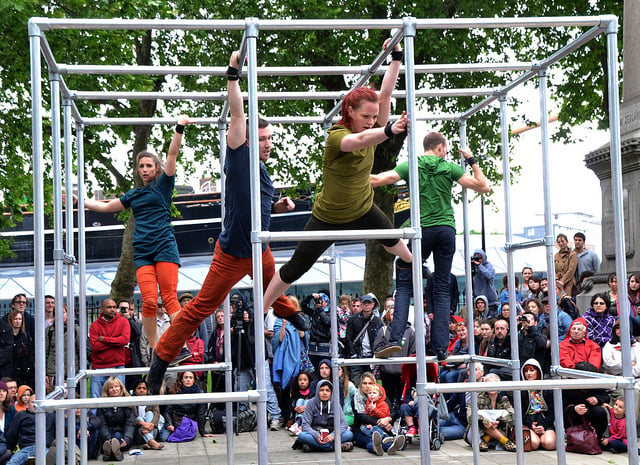
Motionhouse: a 2012/13 Strategic Touring award winner for work across 7 English regions
Photo: smokeghost (CC BY-NC-SA 2.0)
ACE touring budget under-subscribed
Insufficient quality applications to Arts Council England’s Strategic Touring programme could mean that some of the remaining £21m budget is used to support touring applications to the Grants for the Arts programme instead.
The number of applications to Arts Council England’s (ACE) Strategic Touring programme fell significantly from 2013 to 2014, as did the value of the successful projects, which were awarded a total of £9.3m last year compared with £14.8m in the previous year. As a result, the value of Strategic Touring work in every single English region fell last year – by more than £0.5m each in London, the East, and the South East.
ACE initially budgeted £45m for the 2012-15 Lottery-funded Strategic Touring programme and £20.9m remains to be allocated this financial year, but it has warned that the allocation of this year’s full budget will depend on demand and the quality of applications received. Whereas 200 applications were made to the Strategic Touring programme during the first year of the scheme, requesting a total of £42.3m, the following year the number of applications dropped to 138 and the value of those requests fell to £25.5m. A spokesperson told AP: “Arts Council staff will continue to provide specific advice and guidance to potential applicants. There are inherent and long standing challenges in achieving our ambition – in reaching all parts of the country, rural and urban, cities and suburbs, and in reaching people from many different backgrounds and communities… Looking at current demand and our conversations with potential applicants it is possible that we may not award all of the remaining budget in this financial year.” If insufficient applications of the right quality are forthcoming, ACE will consider carrying over the money to 2015/16, or “potentially allocating a proportion of it to support touring applications to the Grants for the arts national activities programme in this current financial year”.
Aside from the decrease in the overall investment in touring last year, some progress was made towards the goal of supporting touring to areas of least engagement with the arts. The percentage of funding reaching local authorities in the bottom third for arts engagement rose from 51% to 58%. Work for children and young people comprised 41% of the total, and 23% was aimed at people from a “culturally specific” background. The proportion of awards going to each region remained similar over the two years, although there were some notable winners and losers. The highest proportion of the money awarded (41%) went to London-based organisations – a one percentage point fall from the previous year – while the proportion of Strategic Touring work actually taking place in London fell by two percentage points, from 9% to 7%. The value of successful bids from arts organisations based in the East fell from 11% to 4% of the total, and the value of work touring in that region also fell, from 11% to 7% of the total.
At the end of the first year of the programme, ACE refined its focus to specifically encourage proposals that would most closely match artistic experiences with the communities to which they would be touring, and that would share knowledge and skills related to touring and audience development. Applications from arts venues that are supported or run by local authorities and receive no core ACE funding were particularly welcomed. But under the new emphasis the amount of proposed work that would benefit disabled audiences fell, and work to develop relevant touring networks and increase opportunities for disabled audiences to experience high quality touring work remains a priority for ACE. Combined arts, visual arts and theatre were more successful than other artforms, so this year literature and dance-based proposals are particularly welcome, though ACE recognises that “there are particular challenges around theatre touring at the moment, especially at mid-scale” and plans to “look at how the Strategic Touring programme can provide additional help in order to address this challenge”.
Join the Discussion
You must be logged in to post a comment.